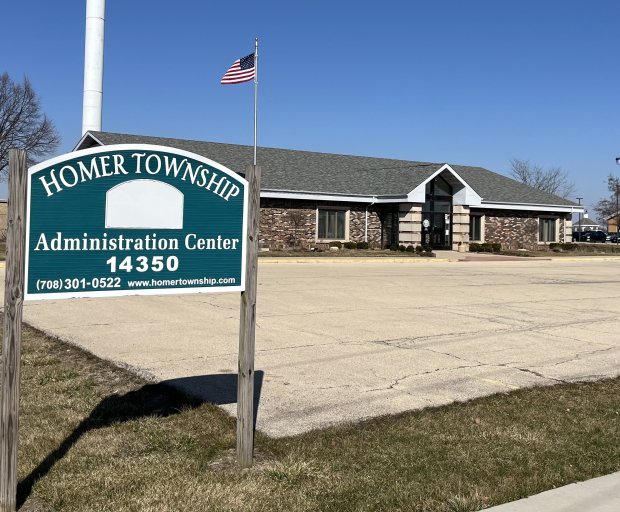Homer Glen residents will be asked in the March 19 election whether the village should pursue efforts to potentially dissolve or discontinue township government, a move supporters say would be the first step to eliminate layers of government and duplicative services and save taxpayer money.
“This is a local advisory opinion on public policy,” village attorney Michael Pasquinelli said. “Whether this is accepted or rejected by the voters has no legal consequence.”
Mayor Christina Neitzke-Troike said the referendum is not binding, but rather will gauge residents’ feelings and give the Village Board direction.
If the referendum passes, it would show residents are interested in eliminating a layer of government, Neitzke-Troike said, noting Illinois has three times more government bodies than other states.
She said other elected officials are watching Homer Glen, and the village can be a trailblazer.
“If residents vote yes, this will put pressure on all taxing bodies,” Neitzke-Troike said. “Residents are fed up. We can’t afford it any more. If residents say ‘Yes, get rid of taxing bodies we don’t need,’ it will speak volumes.”
Homer Glen makes up nearly 62% of the township, with Lockport accounting for about 30%. About 6.8% of the township is unincorporated area and just over 1% is New Lenox and Lemont combined.
Homer Township collects $1.94 million in taxes, including taxes levied by the highway department, Homer Glen treasurer John Sawyers said. Of that, Homer Glen residents are paying nearly $1.2 million to the township, he said.
A home worth about $375,000 pays nearly $169 in property taxes to Homer Township based on the 2022 tax rates, Sawyers said.
Neitzke-Troike said the Homer Glen residents are paying for township services they don’t receive.
“This was never proposed to benefit us as a village in any way,” Neitzke-Troike said. “This was proposed to save residents money. We need to give some tax relief to residents.”
Homer Township Supervisor Steve Balich said, however, the township provides several services to its residents.
The township takes care of some roads that Homer Glen residents use, maintains open space and a dog park, has a medical supply cabinet to loan walkers, shower chairs, crutches and other items, offers senior services and plans events such as a senior expo and a pet fair, he said.
The township is also working on plans for a civic center that when complete would provide after school programs, gardening programs and recreational opportunities for individuals with special needs, Balich said.
“Are we going to exclude Homer Glen? No,” Balich said.
Homer Township operates at a low cost and connected to the people, and residents turn to township officials when needing help on various problems, Balich said.
Balich said what complicates the referendum is Homer Township serves an area larger than just Homer Glen, but only Homer Glen residents will see the question on the ballot.
Supporters of the referendum said the township was more necessary before the village incorporated in 2001.
Neitzke-Troike said the residents are paying for duplicative services.
She said the village’s Ability Awareness Committee also has a medical closet and the village offers senior services.
The village took control of several parks within its boundaries that the township used to maintain, she said. But the township kept its open space properties that generate it revenue from leasing to area farmers.
A few years ago, Homer Glen took over maintenance of 130 miles of roads as well as equipment from the Homer Township Road District when it formed its Public Works Department. The village can explore adding about 18 miles of roads still under the township road district’s authority to its system, Neitzke-Troike said.
It costs about $12,100 in taxes per mile for Homer Glen Public Works Department to maintain its 130 miles of roads, whereas it costs nearly $44,000 per mile for the Homer Township Road District to maintain 18 miles, Sawyers said.
Homer Township Road Commissioner Brent Porfilio disputes those numbers. He said it costs the township about $43,000 per mile for 18.5 miles of township roads. But when including the village costs from all of the funds used to support roads, sidewalks, sewers, lighting, curbs, gutters and other work in the right of way, Homer Glen spends about $53,000 per mile, he said.
The township road district has been able to operate more efficiently, employs two people, has better equipment and uses better road salt in the winter, Porfilio said. All inspections for engineering and construction projects are done by Porfilio, an engineer who has an Illinois Department of Transportation construction inspection certificate, at no additional cost to taxpayers.
Because of its efficient operations, there is no way he would turn over the 18.5 miles of roads to the village, he said.
“It is not cheaper to taxpayers to dissolve the township,” Porfilio said. “People who live in unincorporated areas don’t want to be in the village. They had over 20 years to (annex). They don’t want the taxes or regulations.”
Neitzke-Troike said unincorporated areas would not be forcibly annexed.
The General Assembly must grant special authority to a county or municipality seeking to dissolve just one township, according to the Illinois Policy Institute, a nonprofit research and education organization that advocates for improving laws and regulations affecting Illinois.
Neitzke-Troike said the Illinois General Assembly has granted some authority to consolidate or dissolve units of local governments.
A law was created in 2013 allowing Evanston Township to be dissolved and a separate law was also created to allow the DuPage County Board to dissolve or consolidate various units of government. In 2016, another law allowed McHenry and Lake counties to dissolve units of government and Belleville was also given authority to dissolve its township.
The village of Homer Glen has spent about $4,050 in legal fees exploring the referendum.
Neitzke-Troike said if the referendum passes, she would like to work on various ways that residents’ taxes could be cut.
Michelle Mullins is a freelance reporter for the Daily Southtown.





